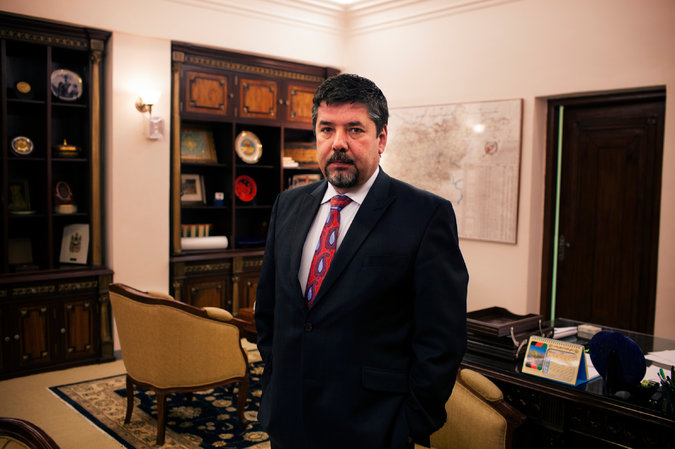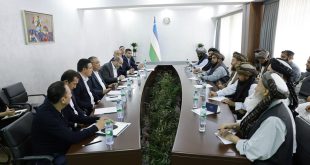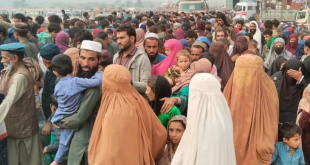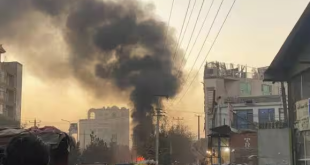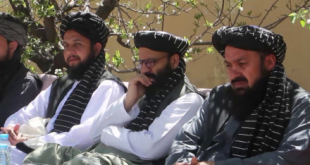Pakistan the Biggest Supporter of International Terrorism!
From its establishment based on religious ideology, Pakistan has attempted to use religious extremism and terrorism as tools, in addition to its military forces, to ensure its continued existence.
The invasion of the former USSR in Afghanistan and the rule of Gen. Zia-ul-Haq provided fertile ground for Pakistan to use extremism for putting pressure on neighboring India because of the Kashmir dispute and also to entrench its hegemony and expansionist ideals.
This was when Pakistan started making maximum use of its “3A” (Allah, Army and America) Strategy. With the help of the United States, and under the pretext of equipping and arming Afghanistan’s Mujahedeen, Pakistan equipped its own army. It lay the foundation for thousands of religious schools (madrassas) with the objective to empower, train and recruit people for the Jihad in Afghanistan.
According to official figures by the government of Pakistan (Pakistan’s National Security Policy 2014-2018), there are more than 150,000 religious schools (madrassas) in that country. Most of them are training recruits in extremism and violence under the name of Islam.
Only 25,000 of the madrassas are registered with the Pakistani government. According to the document, 51 terrorist groups are active in Pakistan and recruit from the above-mentioned madrassas.
After the 9/11 attack in the USA and the direct involvement of world powers in Afghanistan, the international community contended that Pakistan’s army and intelligence agency were using terrorism and extremism to achieve its strategic goals. After Osama bin Laden was killed near a military academy in Pakistan, that view was turned into a reality.
The Haqqani organization is one of the terrorist networks that drew the attention of Pakistan during Jihad in Afghanistan. It has since become a strong source for Pakistan’s intelligence for the strengthening of al-Qaeda, fueling the flames of war and terrorism in Afghanistan as well as against international troops and the government and people of Afghanistan.
In the same way Pakistan uses Lashkar-e-Taiba against India. This does not mean that the United States and its international allies are not aware of Pakistan’s tactics.
Pakistan’s military has also promised US officials on several ocassions that it would suppress terrorist groups. US expected that the Haqqani network and foreign terrorists would be tackled in the Zarb-e-Azb operation, carried out by Pakistani military in North Waziristan. However, Pakistan’s military started the Zarb-e-Azb Operation six days before the presidential elections in Afghanistan when the Afghan security forces were busy ensuring the safety of the polls.
The operation was carried out without coordination with the Afghan government. Pakistan used that opportunity to clear the way for a huge number of terrorists, including foreign rebels, to enter Afghanistan. Pakistan even reopened the main routes for terrorists to infiltrate Afghanistan. Those routes were previously closed after pressure by the US on Pakistan. The routes included Kotal-e-Shah Salim, Topkhana, and a number of areas in Paktika, Nangarhar, Kunar and Nuristan provinces.
The purpose was to create escape routes for terrorists and to aid and abet their infiltration in the north, north-eastern, east and south-eastern provinces of Afghanistan.
After the implementation of the second round of operation Zarb-e-Azb, Pakistan placed a number of al-Qaeda members and other terrorist groups including Taliban in Paktika, Zabul, Kandahar and Helmand provinces of Afghanistan. A number of these al-Qaeda camps were attacked by joint Afghan and foreign troops operations. There is new documentary evidence that those bases have been reactivated.
There is no doubt that the reactivation of al-Qaeda is causing major concern among US officials.
Pakistan has not only refrained from attacking what they deem to be “good terrorists” such as the Haqqani network during Zarb-e-Azb operation, but the Pakistani military also moved their families, weapons and equipment to safety before they started the operation. There is no doubt that Afghan and US intelligence were well aware of the moves and were monitoring the situation. Besides collecting information from human and technical resources, they collected information from other sources as well.
Here I share some documented evidence that reveals the involvement of Pakistan and ISI’s support to the Haqqani network and other terrorist groups. I do this in order to make the public aware of these issues. It is pertinent to mention here that there are hundreds of documents in the National Directorate of Security (NDS) archive that clearly indicate support of Pakistan to terrorists:
Document (1): Rabbani, one of the officials from Office MI-422 of Peshawar, in an official letter to Colonel Sahamim Khalid head of Central office of MI-22 in Rawalpindi has disclosed the transfer of the Haqqani network commander to Miranshah to North Waziristan after Operation Zarb-e-Azb: According to the directive dated 18.03.2015 by the Central Office of MI that was contacted by Hotline & Passcom, the office has tasked the following employees to transfer Atta Mohammad and Hafiz Loqmanullah, the commanders of group of Mawlawi Zar Mohammad, a member of Haqqani network, to a military camp in Data Khalil area in Miranshah, North Waziristan. The two commanders were transferred in border police uniforms and in army vehicles. In order to get more information, the central office was asked to get information from the head of the MI-7th office in Miranshah.
Document (2): The central office CTC located in Islamabad sent an official letter dated 16.03.2015 to its office in Nowshera, where it directed the office to brief the central office about the situation of all the personnel and commanders of Haqqani network located in the triangle between Nowshera, Mardan and Sawabi and as well as monitoring their current address, get contact numbers and other relevant information.
The document specified that the central office of ISI directed the 945 and 935 offices to send all members and fighters of Haqqani network to Tochi, Mir Ali and Miranshah, under the cover of military troops.
It is pertinent to mention that the objective of this move by the ISI was the safety of Haqqani network members, because the recent reports from the organization was to alarm them of the threat to the lives of Haqqani network personnel.
In this regard, the central office of ISI directed the Nowshera office to task its relevant department to take security measures for families of Haqqani network members and to ensure their transfer to North Waziristan. The Nowshera office was also directed to send a report about the situation in the areas and districts in four rounds to Colonel Ghulam Abbas, Head of CVC Office in Islamabad.
Document (3): The central office of Military Intelligence (MI) located in Islamabad, directed the MI-422 office in Suba Sarhad in an official letter to arrange a direct meeting with two leaders of the Taliban including Hafiz Gulbahadur and Mawlawi Hamdullah and to arrange their residence in Hayat Abad and Tahkal areas in Peshawar. The two leaders and their supporters escaped to Peshawar because of the military operation in Miranshah in North Waziristan. The letter also directed the MI-422 office to arrange and rent residential houses for the commanders, and give them security guards and special vehicles for their safety and security. Afterwards, the MI-422 office leadership had a direct meeting in its office with the commanders where they discussed security, residence and other issues related to the commanders and at the end the leadership promised Hafiz Gulbahadur and Mawlawi Hamdullah to arrange the needed facilities as soon as possible and they (the Taliban leaders) assured the commanders of their best efforts to follow the goals that they wanted to achieve in Afghanistan, using the collaboration and facilities on hand.
The Pakistani military conducted the Zarb-e-Azb operation only against the groups that had enmity with Pakistan’s government. This comes after the United Sates vowed that they will also target the Haqqani network.
During national and international events, Pakistani military often mention the Operation Zarb-e-Azb as their achievement and evidence of their serious stance in war against terrorism. They have, however, never been able to show documents to the US and Afghan governments that they have killed members and commanders of Haqqani network during this operation. This has increased the anger of Afghan people and the United States.
After the National Unity Government (NUG) was established, its leaders started talks with Islamabad with a very optimistic hope that they will open a new door in Af-Pak relations. Afghan President Ashraf Ghani made his first foreign trip to Pakistan in November 2014 and met with Pakistani officials. His meeting with Raheel Sharif, Chief of Army Staff of Pakistan, was one of his most important meetings of this trip. The meeting took place behind closed doors. In this meeting, the two sides made serious commitments for cooperation. These meetings and trips of Afghan and Pakistani officials – including ISI officials – were mostly held behind closed doors and continued up to the end of the year. They later proved to be an illusion and trick by Pakistani military rather than paying attention to the intelligence documents of the Afghan government. Unfortunately, the National Unity Government gifted one-sided and unprecedented privileges to the Pakistani military. In most cases the privileges were against the country’s national interests, but no privilege was received by Afghanistan from the Pakistani side.
After the trip, Raheel Sharif traveled to the US and shared the commitments made between Afghan President and Pakistani officials in order to appease dissatisfied US officials after the Zarb-e-Azb operation which was part of Pakistan’s dishonesty. In a trip that lasted seven days, Sharif once again vowed to take serious measures against terrorist organizations that are involved in Afghanistan’s instability. He also promised to bring the Taliban to the table of negotiations and to establish better ties with the new government in Afghanistan. In response, the United States vowed to reduce the drone attacks in tribal areas and to intensify attacks on Tehrik-e Taliban Pakistan (TTP) that resided along the Durand Line after an agreement with NUG leaders.
The US also announced that the Taliban is no longer a serious threat to the United States. This to ensure that the Taliban would come to the negotiations table with the Afghan government. The US vowed that the coalition forces will not target the Taliban afterwards. The US, in addition, vowed to reduce India’s role in Afghanistan. Based on that, President (Barack) Obama announced an end to the war in Afghanistan in a responsible way.
But since 2014 until now Pakistan has not only brought changes in its two-faced approach to Afghanistan. It has clearly interfered in some cases, and after the reports about the death of (former Taliban leader) Mullah Omar in Pakistan, they accepted that the Afghan Taliban are inside Pakistan and are under Pakistan’s control. Pakistan made this announcement to take Afghanistan’s issue completely under its control.
The Afghan president also announced that we should first reconcile with Pakistan and even he added that Afghanistan and Pakistan both are victims of terrorism. Meanwhile, President Ghani made some remarks in Munich in Germany in this regard which somehow meant that Afghanistan is the center of international terrorism. While Afghanistan is not only the center of terrorism, it is the main victim of this menace. Pakistan has continued its two-faced policies in three fields, using the opportunities on the ground. These fields include:
- Providing more equipment and arms to the Taliban and other terrorists to extend the war and take control of more areas. In so doing it would tie down the Afghan security forces in a war of attrition.
- Creating and fueling differences among tribes in Afghanistan in different ways.
- Creating an environment of mistrust among Afghanistan’s politicians and trying to infiltrate government offices by causing an environment of mistrust.
There are a number of other documents that reveal the involvement of Pakistani military in supporting terrorism in Afghanistan.
Document (4): This document has discussed the attack on Kabul Airport which was carried out during President Hamid Karzai’s government.
On July 2014, an official letter from central office of ISI in Islamabad was sent to MI-422 office in Swaba, Khyber Pakhtunkhwa, where it directed the office to thank those that successfully plotted the attack on Kabul Airport (now Hamid Karzai International Airport) and gave 2.5 million Pakistani rupees to every one of the following people: Haji Khalil Haqqani, Haji Hakim Woluswal, Qari Zahir Shah and Mawlawi Hakim. Moreover, the office was directed to donate 1.5 million Pakistani rupees to the families of those that were involved in the attack.
Meanwhile, the office was directed to talk about details of an attack on the Ministry of Borders and Tribal Affairs in Kabul and that it should be done by the Haqqani network, and present their report about their tasks by 3pm on July 23.
Document (5): The ISI 945 office in Khyber Pakhtunkhwa in an official note dated April 6, 2015 to the central office in Islamabad wrote that: Officials of 945 office in a meeting with Toryalai, head of the network, and his co-fighters on April 5, 2015 were tasked to kidnapped and kill Afghanistan’s Shia leaders in Herat, Kabul and Farah. In addition, they gave 2 million Pakistani rupees to the participants at that meeting.
It was also specified that the relevant department of office 945 should prepare the required weapons and other equipment by Toryalai through the COD Akora Khattak and give them the weapons on the mentioned date. Meanwhile, the note mentioned that 23 people from Toryalai’s group who were busy in military training in Cherat had completed their training.
Document (6): The central office of ISI located in Quetta in a tentative note to central office of IW in Islamabad and 945 office in Rawalpindi, presented the result of the visit of a number of officers with the Taliban’s Quetta Shura as follows:
The members of Taliban’s Quetta Shura held a meeting about the peace process with the Afghan government in which key commanders of the Shura attended. They talked about mutual interests and policies already given to them. In addition, the involved officials gave needed directions to members of the council about the process. It is pertinent to mention that the note stated that the advisory board (945, CID) forwarded all those terms and preconditions as directed from GHQ. After that the Shura decided it will be mutual then will be forwarded on a priority basis.
The documents reveal Pakistan’s clear support of terrorism in the world and that Pakistan supports international terrorism strategically and systematically in a bid to gain its objectives in the region and in the world.
On the other side, Pakistan’s strategic ally, the People’s Republic of China for the first time endorsed direct communication with the former government in Afghanistan after the two countries initiated their intelligence cooperation at the end of 2013. At that time the Afghan government provided China with solid and irrefutable intelligence documents proving Pakistan’s intelligence services’ direct involvement in providing safe havens and shelter to East Turkistan Islamic Movement. The Chinese assessment of the situation in Afghanistan from the Pakistani point of view visibly deteriorated and caused China to enter in direct communication with the Afghan government.
In addition, China was also requested to adopt a clear policy in the wake of Pakistan’s insincerity toward the situation in Afghanistan and East Turkistan Islamic Movement and expand its engagement with Afghanistan.
The flexibility that was witnessed in Iran-US bilateral ties, finding a common view of the interests of the two nations in the region alongside India’s soft and patient economic and political diplomacy as well as the expansion of cooperation between India and Iran, paved the way to diminish Pakistan’s importance among serious regional players.
With consideration of what we have discussed so far, the recent positions taken by the president and the US government on Pakistan in recent weeks brings us to the conclusion that the western countries particularly the United States over recent years has made several attempts aimed at convincing Pakistan to stop pursuing a double standard policy in combating terrorism and for safeguarding its importance in international arena. That meant that Pakistan’s regional interactions for protecting its national interests cannot be successful if Pakistan explained its national interests from under the shadow of supporting terrorism and extremism.
By assessing the above points, one thing becomes clear that relations between the US and Pakistan have worsened.
Despite that, the people of Afghanistan are determined to forge friendly relations with the neighboring countries on the basis of mutual respect and safety of its national sovereignty. In the short term, however, it seems to be impossible to achieve that dream in the wake of decades of hostile policies and interference by Pakistani governments in Afghanistan. As a consequence, the system, the politicians and the people of Afghanistan should try to get advantage of the available opportunities to them.
Recommendations:
- The government of Afghanistan, in line with the lessons it has learned over the past 30 years, must define an interest-oriented policy which is clear and practical and then implemented it in its foreign policy regarding Pakistan.
- I call on the people of Afghanistan to strengthen their unity.
- I call on youth of the country to know their friends and enemies. Our brothers are not our enemies. Our enemies are outside Afghanistan. Afghans must defend their interests and people and join their other brothers and sisters who do not allow the enemy to divide them under the name of cast, race and language.
- While I strongly appreciate the recent support of the president for our defense and security forces, I want to urge that there should be a clear definition of friend and enemy at various levels. A clear strategy and comprehensive policy must be defined which can help the security and defense. Our intelligence forces should act upon it and combat the enemy on the basis of the same strategy.
Note: it is important to mention that the publication of these documents will not pose any threat to the lives of employees of the National Directorate of Security (NDS) and I believe that making these documents public, will help our national interests.
 Afghanistan Times
Afghanistan Times
